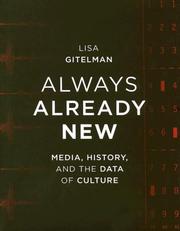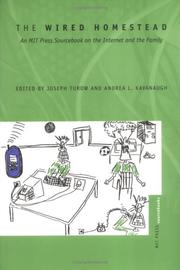| Listing 1 - 10 of 36 | << page >> |
Sort by
|
Book
ISBN: 0262258153 1282694421 9786612694424 0262258730 Year: 2009 Publisher: Cambridge, MA : MIT Press,
Abstract | Keywords | Export | Availability | Bookmark
 Loading...
Loading...Choose an application
- Reference Manager
- EndNote
- RefWorks (Direct export to RefWorks)
What are the global implications of the looming shortage of Internet addresses and the slow deployment of the new IPv6 protocol designed to solve this problem? This book looks at this question and much more.
Book
ISBN: 1282638327 9786612638329 0262272083 9780262272087 9781282638327 9780262014397 0262014394 9780262513739 0262513730 Year: 2010 Publisher: Cambridge, Mass. MIT Press
Abstract | Keywords | Export | Availability | Bookmark
 Loading...
Loading...Choose an application
- Reference Manager
- EndNote
- RefWorks (Direct export to RefWorks)
Here, experts examine ways in which the use of increasingly powerful and versatile digital information and communication technologies are transforming research activities across all disciplines.
Research --- Information technology. --- Methodology. --- Technological innovations. --- Electronic books --- INFORMATION SCIENCE/Internet Studies --- INFORMATION SCIENCE/General
Book
ISBN: 0262297930 1283321769 9786613321763 0262298813 9780262298810 9781283321761 9780262016315 0262016311 9780262297936 6613321761 Year: 2011 Publisher: Cambridge, Mass. MIT Press
Abstract | Keywords | Export | Availability | Bookmark
 Loading...
Loading...Choose an application
- Reference Manager
- EndNote
- RefWorks (Direct export to RefWorks)
Here, Susanna Paasonen moves beyond the usual debates over the legal, political, and moral aspects of pornography to address online porn in a media historical framework, investigating its modalities, its affect, and its visceral and disturbing qualities.

ISBN: 9780262072717 0262072718 0262572478 9786612097942 1282097946 0262273896 1429477342 9780262273893 9781429477345 9781282097940 6612097949 Year: 2006 Publisher: Cambridge, Mass. : MIT Press,
Abstract | Keywords | Export | Availability | Bookmark
 Loading...
Loading...Choose an application
- Reference Manager
- EndNote
- RefWorks (Direct export to RefWorks)
An analysis of the ways that new media are experienced and studied as the subjects of history, using the examples of early recorded sound and digital networks.
Book
ISBN: 9780262016643 9780262298476 0262016648 0262298473 1283448874 9781283448871 9786613448873 0262297582 Year: 2011 Publisher: Cambridge, Massachusetts ; [Piscataqay, New Jersey] MIT Press IEEE Xplore
Abstract | Keywords | Export | Availability | Bookmark
 Loading...
Loading...Choose an application
- Reference Manager
- EndNote
- RefWorks (Direct export to RefWorks)
In making decisions, we often seek advice. Online, we check Amazon recommendations, eBay vendors' histories, TripAdvisor ratings, and even our elected representatives' voting records. These online reputation systems serve as filters for information overload. In this book, experts discuss the benefits and risks of such online tools. The contributors offer expert perspectives that range from philanthropy and open access to science and law, addressing reputation systems in theory and practice. Properly designed reputation systems, they argue, have the potential to create a "reputation society," reshaping society for the better by promoting accountability through the mediated judgments of billions of people. Effective design can also steer systems away from the pitfalls of online opinion sharing by motivating truth-telling, protecting personal privacy, and discouraging digital vigilantism.
Book
ISBN: 9780262331227 0262331225 9780262528207 0262528207 9780262029889 026202988X 0262331233 Year: 2016 Publisher: Cambridge, MA
Abstract | Keywords | Export | Availability | Bookmark
 Loading...
Loading...Choose an application
- Reference Manager
- EndNote
- RefWorks (Direct export to RefWorks)
Behind-the-scenes stories of how Internet research projects actually get done.The realm of the digital offers both new methods of research and new objects of study. Because the digital environment for scholarship is constantly evolving, researchers must sometimes improvise, change their plans, and adapt. These details are often left out of research write-ups, leaving newcomers to the field frustrated when their approaches do not work as expected. Digital Research Confidential offers scholars a chance to learn from their fellow researchers' mistakes--and their successes. The book--a follow-up to Eszter Hargittai's widely read Research Confidential--presents behind-the-scenes, nuts-and-bolts stories of digital research projects, written by established and rising scholars. They discuss such challenges as archiving, Web crawling, crowdsourcing, and confidentiality. They do not shrink from specifics, describing such research hiccups as an ethnographic interview so emotionally draining that afterward the researcher retreated to a bathroom to cry, and the seemingly simple research question about Wikipedia that mushroomed into years of work on millions of data points. Digital Research Confidential will be an essential resource for scholars in every field.ContributorsMegan Sapnar Ankerson, danah boyd, Amy Bruckman, Casey Fiesler, Brooke Foucault Welles, Darren Gergle, Eric Gilbert, Eszter Hargittai, Brent Hecht, Aron Hsiao, Karrie Karahalios, Paul Leonardi, Kurt Luther, Virag Molnar, Christian Sandvig, Aaron Shaw, Michelle Shumate, Matthew Weber

ISBN: 0262285282 1423729870 9780262285285 9781423729877 9780262700948 0262700948 Year: 2003 Publisher: Cambridge, Massachusetts [Piscataqay, New Jersey] MIT Press IEEE Xplore
Abstract | Keywords | Export | Availability | Bookmark
 Loading...
Loading...Choose an application
- Reference Manager
- EndNote
- RefWorks (Direct export to RefWorks)
"The use of the internet in homes rivals the advent of the telephone, radio, or television in social significance. Daily use of the World Wide Web and e-mail is taken for granted in many families, and the computer-linked internet is becoming an integral part of the physical and audiovisual environment. The internet's features of personalization, interactivity, and information abundance raise profound new issues for parents and children. Most researchers studying the impact of the internet on families begin with the assumption that the family is the central influence in preparing a child to live in society and that home is where that influence takes place. In The Wired Homestead, communication theorists and social scientists offer recent findings on the effects of the internet on the lives of the family unit and its members. The book examines historical precedents of parental concern over "new" media such as television. It then looks at specific issues surrounding parental oversight of internet use, such as rules about revealing personal information, time limits, and web site restrictions. It looks at the effects of the web on both domestic life and entire neighborhoods. The wealth of information offered and the formulation of emerging issues regarding parents and children lay the foundation for further research in this developing field. The contributors include Robert Kraut, Jorge Reina Schement, Ellen Seiter, Sherry Turkle, Ellen Wartella, and Barry Wellman."
Internet --- Computers and families --- Computer Science --- Engineering & Applied Sciences --- Social aspects. --- Social aspects --- Computers and family --- Families and computers --- DARPA Internet --- Internet (Computer network) --- Families --- Wide area networks (Computer networks) --- World Wide Web --- Computers and families. --- INFORMATION SCIENCE/Internet Studies
Book
ISBN: 026228104X 1435691830 9780262281041 9780262151207 0262151200 9781435691834 Year: 2008 Publisher: Cambridge, Mass. MIT Press
Abstract | Keywords | Export | Availability | Bookmark
 Loading...
Loading...Choose an application
- Reference Manager
- EndNote
- RefWorks (Direct export to RefWorks)
Modern science is increasingly collaborative, and this volume looks at the challenges and rewards of scientific collaboration enabled by information and communication technology, from theoretical approaches to in-depth case studies.
Science --- Internet. --- Computer network resources. --- DARPA Internet --- Internet (Computer network) --- Natural science --- Science of science --- Sciences --- Wide area networks (Computer networks) --- World Wide Web --- INFORMATION SCIENCE/Internet Studies --- INFORMATION SCIENCE/General --- Natural sciences
Book
ISBN: 1280768215 9786613678980 0262301202 9780262301206 9780262017251 0262017253 Year: 2012 Publisher: Cambridge, Mass. MIT Press
Abstract | Keywords | Export | Availability | Bookmark
 Loading...
Loading...Choose an application
- Reference Manager
- EndNote
- RefWorks (Direct export to RefWorks)
Drawing on literature from many disciplines and using a theoretical framework developed for the study of environmental commons, Schweik and English examine stages of open-source software (OSS) development, presenting multivariate statistical models of success and abandonment.
Open source software. --- Information commons. --- Commons, Information --- Commons, Learning --- Learning commons --- Free software (Open source software) --- Open code software --- Opensource software --- Computer software --- Open source software --- Information commons --- INFORMATION SCIENCE/Internet Studies --- DIGITAL HUMANITIES & NEW MEDIA/General --- COMPUTER SCIENCE/General
Book
ISBN: 0262317818 9781461947349 1461947340 129998830X 9781299988309 9780262317818 9780262019644 0262019647 0262317826 Year: 2013 Publisher: Cambridge, Massachusetts
Abstract | Keywords | Export | Availability | Bookmark
 Loading...
Loading...Choose an application
- Reference Manager
- EndNote
- RefWorks (Direct export to RefWorks)
An investigation of how governments, organizations, and groups use the Internet to promote civic and political engagement among young people. There has been widespread concern in contemporary Western societies about declining engagement in civic life; people are less inclined to vote, to join political parties, to campaign for social causes, or to trust political processes. Young people in particular are frequently described as alienated or apathetic. Some have looked optimistically to new media--and particularly the Internet--as a means of revitalizing civic life and democracy. Governments, political parties, charities, NGOs, activists, religious and ethnic groups, and grassroots organizations have created a range of youth-oriented websites that encourage widely divergent forms of civic engagement and use varying degrees of interactivity. But are young people really apathetic and lacking in motivation? Does the Internet have the power to re-engage those disenchanted with politics and civic life? Based on a major research project funded by the European Commission, this book attempts to understand the role of the Internet in promoting young people's participation. Examples are drawn from Hungary, the Netherlands, Slovenia, Spain, Sweden, Turkey, and the United Kingdom--countries offering contrasting political systems and cultural contexts. The book also addresses broader questions about the meaning of civic engagement, the nature of new forms of participation, and their implications for the future of civic life.
Youth --- Internet and youth. --- Internet --- Political activity. --- Political aspects. --- Youth and the Internet --- Politics and young people --- Youth in politics --- INFORMATION SCIENCE/Internet Studies --- DIGITAL HUMANITIES & NEW MEDIA/General --- SOCIAL SCIENCES/Political Science/General
| Listing 1 - 10 of 36 | << page >> |
Sort by
|

 Search
Search Feedback
Feedback About UniCat
About UniCat  Help
Help News
News